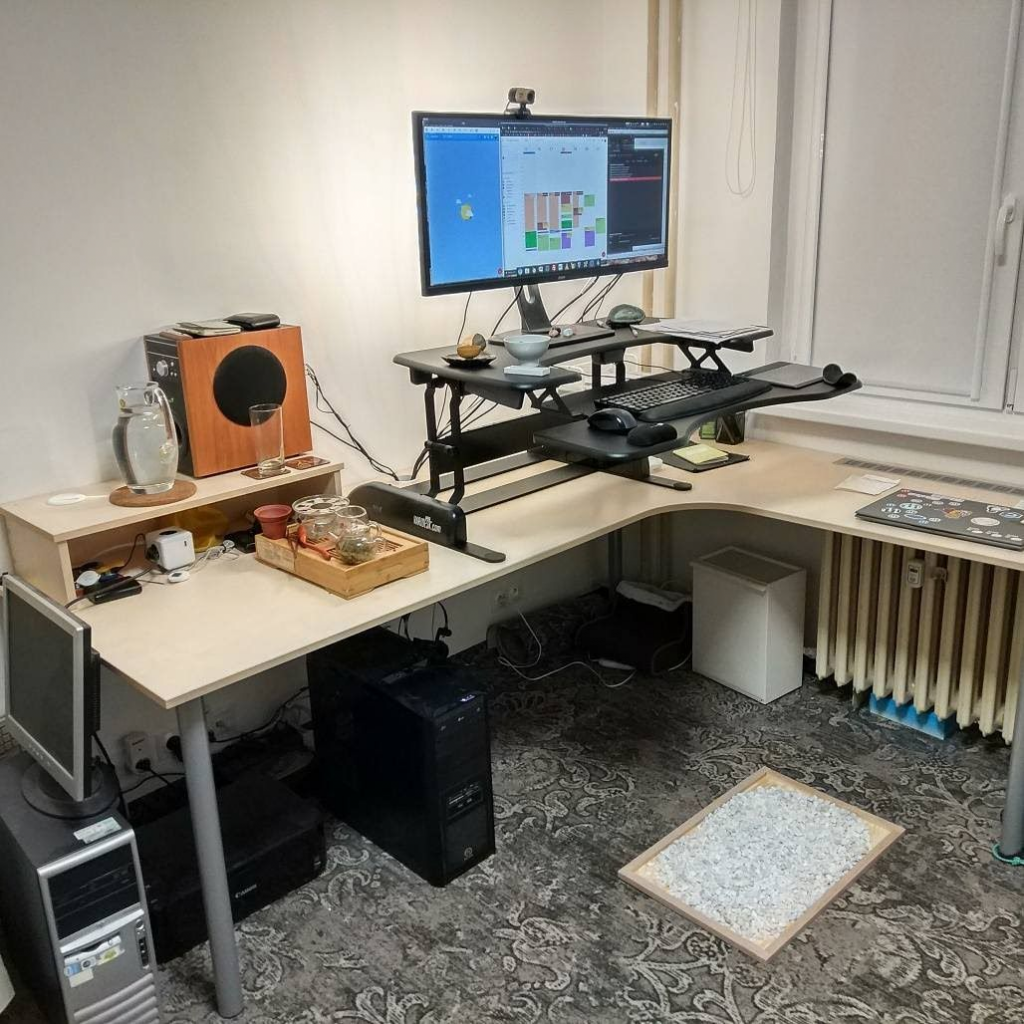
I wake up to the sound of rain. Light but persistent drizzle that’s been going on throughout the night and made the cold morning air feel fresh and humid. A few birds are chirping in the garden, feeding on grapes I hoped I’d be able to enjoy at some point. This type of quiet, where you can hear any signs of human civilization only from the distance – like the ultralight airplanes occasionally crossing the sky or a church bell from the nearest village – has always been one of my most fundamental needs.
Here, I receive plenty of it.
I check the stove to still find some glowing embers inside and feed it with few logs while waiting for my coffee to get ready. It’s about time. In fifteen minutes, I have to be at work.
But how?
By this time, you’ve surely guessed there’s no commute involved. I’m one of the lucky ones who have a remote job, and who truly enjoys it (which is not granted, but more on that later).
Happily employed
As it so often happens, I found my place at OTGS by pure chance, after spontaneously deciding to attend a WordCamp for the first time (also, it was the first one in my city) and then making contact with one of my future coworkers, amongst many other people.
Honestly, the list of previous jobs on my CV was quite short at that point, with university still consuming most of my time. But both I and the company management decided to experiment and I started working part-time.
That was four years and eleven months ago, and that’s how long I’ve been using the phrase “happily employed” to describe my work experience. When someone asks, I usually add that I hope to stay here for at least thirty more years.
It’s worth mentioning that working remotely is a huge factor but it’s definitely not the only one. OTGS is a great company because of its people and the culture it so carefully cultivates. It’s not perfect in all regards, but I believe this level of effort is still quite rare, even these days and even in this profession.
Working in pyjamas? Not exactly.
So, how does it work, having a remote job? I’d say that there are as many different ways as there are companies that allow it. The lines are often blurred and there will be many people with vastly different experiences. All I can reliably talk about is only the job I have, which is fully remote (we don’t have any offices or any headquarters at all).
When people hear about someone working from home, I think they most often imagine a freelancer who gets up around 1 PM, works throughout the night and wears a shirt only when they have a video call with a client (and let’s carefully avoid even discussing trousers).
Well, I guess this is what can happen if you have more freedom than you can handle. But these situations are usually not sustainable and they’re definitely not healthy. And, luckily, that’s not what I’ve experienced.
It’s true that working remotely can be challenging for a number of reasons you wouldn’t find in an office job:
- Family or other household members not understanding that you’re actually working, not just sitting at your computer.
- Nobody looking over your shoulder. You’re the one who has to resist all temptations and distractions.
- There are way more of those temptations than at the office. Mostly, you would probably be tempted to take breaks from work to do some household chores.
- Your social life may require some deliberate care. Otherwise, you risk becoming isolated and developing unhealthy habits.
- There’s a higher risk that the line between work and the rest of your life will blur and you’ll have difficulties unplugging and truly relaxing.
- Keeping in touch with coworkers and building deeper relationships at work becomes more difficult because there are very few opportunities to socialize with them.
While all of these dangers are real, both you and the company can do a lot to mitigate them. In most cases, it’s “simply” a question of adopting the right mindset. Here’s what works for me:
Know when you work
A job is still a job even if you’re working from home. Either I’m working or not, and I always take great care to be very clear about which one it is right now.
Otherwise, there’s a great risk of gradually slipping into that “chaotic freelancer” mode I’ve described above.
One note about this: The internet is full of advice like “dedicate one room in your household just to work” or “the bedroom should only be for sleeping”, but as long as I keep to the above-mentioned rule, it’s not an issue to have my all-purpose PC right next to the bed. It doesn’t have to be perfect, it just has to work well enough.
The company requires most of us to have a more or less fixed schedule, at least at the beginning of the employment. While there’s always been enough flexibility, it gave me something very important: structure. It made the “working or not” question easy to answer. And even nowadays, when I have more freedom to organize my own time than five years ago, I still divide the work into four-hour shifts during which everything and everyone else has to wait (except maybe the delivery guy ringing my doorbell).
Additionally, to make sure you limit your distractions,you may want to use some productivity tracking tool like Toggl and get precise feedback about how you’re spending your time (I’m not going to go into depth about various apps and tools to help with productivity, as that would require a separate article).

Be mindful of your social life
Depending on your situation, that can mean very different things. Even I, an introvert, make sure to go out most evenings that I spend in the city to see friends and relatives, go to a concert or attend a taiji lesson, or even to just hang out at a nearby café and read a book in one of their comfy chairs.
Compared to working in an office with a lot of contact with other people throughout the day, this has a one really big advantage. The overwhelming majority of my social interactions are those I’ve deliberately chosen or accepted, and as a result, I’m able to enjoy them fully. Not being “peopled out” by a noisy and distracting environment during the time I actually need to focus very deeply.
Whatever you do, whatever works for you, just don’t leave it to pure chance and consider your options carefully.
A job is not just about the work
Relationships between coworkers and the overall culture are important in every type of job, remote or not. But when you’re not regularly meeting your peers in person, it also requires a more mindful approach from everyone involved.
Company culture isn’t something that just happens or appears all on its own. It’s something that you do and cultivate, with every little action you take.
First of all, the company management needs to make sure there are opportunities to build meaningful connections between people even in an online environment.
- Making sure that newly hired employees will be a good fit for the team. This can be very difficult but it’s essential for the sustainability of the company and its culture. Just because someone is extremely good at their job shouldn’t mean they’ll be hired automatically.
- Encouraging people to speak up, listen and act on their feedback. And also providing meaningful feedback and encouraging peer reviews, which is not an easy thing to organize.
- Providing a good platform for employees to mingle online (like a G+ community or a set of Mattermost channels for various topics, as we have).
- Making sure there are clearly defined channels for different types of communication, to minimize distractions (e-mails / issue tracker / dedicated chat rooms / video calls / internal company blog, and so on).
- Communicating very clearly in general, but especially about goals. And that means current, practical goals (e.g. what new features or product to provide to our clients), as well as general values the company aims to pursue. For example, OTGS does its best to embody these:
- Quality first
- Excellent support
- Open-mindedness and creativity
- Positive attitude
- Honesty

Second, each and every person in the company has to pay attention to the ways they communicate.
Since we’re distributed across the globe, we’re coming from wildly different cultural backgrounds, religions, political views, and even sense of humor, and it’s essential to keep this in mind, to always act in a respectful and tolerant way. Probably more so than one would have to in a traditional on-site job. But on the other hand, the experience is truly enriching.
Additionally, most of the communication will be written and thus missing important non-verbal cues. This needs to be compensated for by extra clarity, and maybe an emoji here and there if you’re into that (in my experience, they help a lot).
When all the above aspects are taken into account and handled properly, the job has the potential to turn into a truly amazing experience.
I can honestly say that OTGS has made my life better on many levels and without working remotely, my entire lifestyle wouldn’t be even possible.
Home is where the WiFi connects automatically
Lately, my years have a certain rhythm to them. I spend most of the winter in my apartment in Prague, close to family and most of my dearest friends. During the spring and early summer, I usually travel a bit around Europe (mostly without taking any vacations), quite often to attend a WordCamp, or to visit one of my friends from work (which is another advantage, these meetings are always so precious and memorable!). And after that, I would settle in my second home, which is an old house in the countryside, built from the ruins of a 14th century castle.
That’s where I’m writing this from while enjoying all the calmness and peace.
As long as there’s an internet connection (and I somehow managed to negotiate very reliable 20/2 Mbps, wireless from my chimney to a church tower in the village two kilometers away), I can stay here for weeks, working in the garden if the weather allows, not minding that there isn’t even running water (since the house is basically standing on a dry, rocky hill above a valley).
During the week, I work undisturbed and then focus on little improvements around the house, and on weekends, some of my friends or family can visit and spend a few lovely days together. This way, I relax from what is otherwise a very busy and active lifestyle. Obviously it wouldn’t be possible if I had to have an on-site job. I seriously doubt that the nearest city even has any software development jobs to offer at all.
I also travel to a completely different part of Czech Republic to keep my grandfather company for a few days almost every month. If I only had weekends to do it, that would be so much more complicated.
So, for me, the mobility that comes with a remote job is an absolute necessity and is it’s greatest advantage.



Working comfortably
There’s another aspect that I greatly appreciate; the freedom of setting up one’s own work environment and tweaking it to the finest details. At this point, my city workplace includes a huge, custom-made table with a standing desk addon, a 34″ display with backlight made from a Philips HUE led stripe, a self-made pad with crushed marble for feet massaging and also a very special chair fine-tuned to match my body’s needs. Because of my spine being what it is, all this extra comfort is really important to me. And I dare say that no on-site job can match this even if they actually tried, which they wouldn’t.

Conclusion
All this together, with the aforementioned time flexibility, creates a great mix that allows me to be as productive as possible, but in a sustainable way, which in turn makes me feel great and motivated and thus more productive. I couldn’t recommend it enough, as it’s an extremely rewarding experience (at least for a productivity freak like myself).
Needless to say, the list of benefits is not complete. But I hope this article (essay? novel?) gave you an idea of what remote working can be like, and what you can get out of it. Obviously not all remote jobs will offer the same options, but hopefully, you have a clearer idea of what to look for.
My recommendation is: If you can, at least give it a try!

P.S. If you do happen to have an experience with remote work, you’re welcome to share it! How does it compare to what I just described?
Come Work With Us
Are you interested in working with a globally distributed team that encourages growth and advancement? Are you ready to harness the power of technology for a better future?